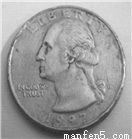题目内容
Grandma had the coin for as long as I can remember. Every time I went over to her house, she told me the story of the coin:

It was the day after the ship had ______ in New York City. My grandmother and grandfather had come from Poland on that ship. They came to______ for a new life in the United States, ______ from the poverty and war in their native land.
They were walking to their new ______ from their factory jobs when they saw a small glint (闪光) on the sidewalk. My grandmother bent over to ______ it more closely. It turned out to be a dark and dirty quarter. My grandmother ______ it up and said,“This coin is a good omen, a ______ of good fortune to come.” They took the coin to their little apartment and ______ it to make it shine. The next day my grandmother got a(n) ______ job at a jewelry store.
As the years passed, my grandparents______good times and bad. My father and uncles were born, my grandfather was ______from the factory, but got a job at a big machinery company. There, my grandparents finally found the good ______ my grandmother had ______.
When my grandfather died three years ago, my grandmother ______ in to live with my family. This is when she ______the coin to me. Every day she told me this story. After a few months I could ______ tell the story in my sleep, ______ still she told me the story every day, stressing the importance of ______ on the coin. Last week she died. According to her ______, I got the coin. I think I was fortunate enough because I got the thing that ______ the most to my grandmother, and I will cherish it forever.
1.A. sailed B. joined C. landed D. pulled
2.A. prepare B. ask C. apply D. search
3.A. absent B. fre C. tired D. independent
4.A. restaurant B. store C. apartment D. cottage
5.A. examine B. observe C. test D. touch
6.A. picked B. dug C. lifted D. fixed
7.A. moment B. message C. gift D. sign
8.A. packed B. cleaned C. repaired D. rebuilt
9.A. worse B. greater C. better D. easier
10.A. got over B. took up C. passed by D. went through
11.A. laid off B. laid down C. shut off D. broken down
12.A. wealth B. chance C. fortune D. situation
13.A. described B. planned C. experienced D. predicted
14.A. settled B. moved C. entered D. dropped
15.A. promised B. presente C. sent D. gave
16.A. hardly B. practically C. particularly D. usually
17.A. and B. so C. but D. however
18.A. keeping B. passing C. carrying D. holding
19.A. order B. dream C. explanation D. will
20.A. proved B. offered C. meant D. contributed
 天天向上一本好卷系列答案
天天向上一本好卷系列答案 小学生10分钟应用题系列答案
小学生10分钟应用题系列答案Because six out of every 10 accidental deaths happen to Chinese children who are playing, Shanghai Johnson & Johnson Pharmaceutical (SJJP), a US?based pharmaceutical giant, is working on a Safe Kids Program to prevent injuries and deaths.
Since the Safe Kids Worldwide was set up in 1987 by Johnson & Johnson in the US, it has contributed to a nearly 40 percent decline in the child death rate from accidental injuries there.Learning from the successful experience, SJJP began the Safe Kids Program in China in 1999.
A recent survey conducted by SJJP and Safe Kids Worldwide China indicates that more than half of the responding parents didn't know how to help their children keep safe and that half of the parents didn't know about their children's motor skill development at different ages.The survey covered 3,359 Beijing, Shanghai and Guangzhou's parents with children between infancy (幼年) and 14.
Additionally, more than 40 percent of the parents didn't know how to help their children to prepare well for sports activities.For instance, they don't know how to have their children warm up or realize the importance of a playground?check before sports activities.
To help correct the problems, SJJP and Safe Kids Worldwide China have been translating and editing safety education materials, sending them to parents free of charge, and delivering free lectures in kindergartens, schools and residential communities for the last 10 years.
Currently, a special team has been set up and traveling around 12 key cities of China to popularize child sports safety knowledge and offer free training for young parents.
Though SJJP refuses to say how much it has spent on the program, it says the number in terms of money, staff and technology, is large.
SJJP was founded by Johnson & Johnson in 1995 and specializes in manufacturing and development of non?prescription medicines (非处方药) and health care foods and products.So far,its investment has exceeded $41 million.
Title: Safe Kids Program
1. | The program is intended to 2. accidental injuries and deaths. |
Background | ◇It is sponsored by SJJP, which specializes in making and 3. non?prescription medicine and health care foods and products. ◇It follows the example of the successful experience of Safe Kids. Worldwide in the US, which accounts for a 40% 4. in such injury cases. |
5. | ◇More than 50% of the parents don't know how to help keep children safe. ◇Half of the parents are not 6.of their children's motor skills. ◇40% or more of the parents fail to help their children prepare well before sports activities, such as warming up and 7. the playground. |
Solutions | ◇They have been sending safety education materials to 8.and delivering lectures in schools and communities, all for 9.. ◇A special team has been 10.and is now traveling around to popularize child sports safety knowledge and offering free training for young parents. |



 check-up tomorrow while having dinner with your family, focus on the here and now — food, the company, and the conversation.
check-up tomorrow while having dinner with your family, focus on the here and now — food, the company, and the conversation.